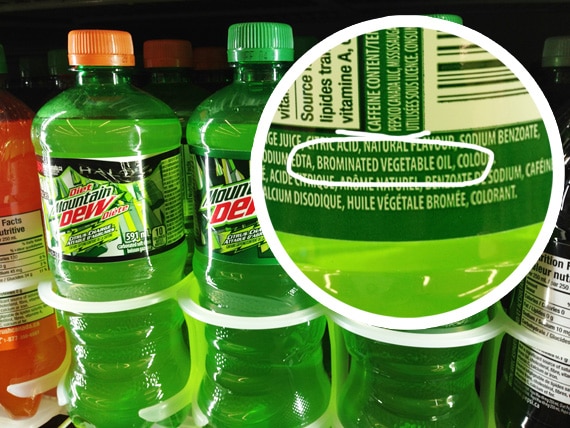
Written By: Gloria Tsang, RD
Title: Founding Registered Dietitian
Alumni: University of British Columbia
Last Updated on:

By now, you may have heard of brominated vegetable oil, or BVO. In October 2023, California became the first State to ban 4 food additives; one of them is brominated vegetable oil. And on November 2nd 2023, FDA proposed to ban BVO, citing potential damage to human health (particularly thyroid) from a recent rat study. If you drink sports drinks or sodas, you might want to learn more about this controversial ingredient that’s used in American products but is banned in Japan and the European Union.
I started writing about BVO in 2013, and have been keeping track of this topic since. As a petition started 10 years ago asking Pepsi to stop adding BVO in Gatorade, this food additive has become highly controversial since. In 2014, both Coke and Pepsi dropped brominated vegetable oil in their formula. And in 2020, Mountain Dew also dropped it from its main line. However, BVO is still found in some consumer drinks.

Table of Contents
Brominated vegetable oil is an emulsifier, a food additive made from vegetable oil with the chemical bromine bonded to the oil. It was used in several popular sports drinks and sodas to keep the flavor well blended throughout the drink rather than floating to the top. It’s a controversial ingredient because bromine is used as a flame retardant, and because excessive consumption can cause some serious health effects.
Most toxicology studies on BVO were conducted in the 1970s and ’80s on rats. All of the studies showed adverse effects. A 1970 UK study actually concluded “the high bromine levels found in the fat of tissues from UK children are due to the use of these compounds [brominated vegetable oils].”
A 1997 study documented a case in which a patient developed the condition of bromism from drinking at least two litres of cola every day. The patient complained of headache, fatigue, and memory loss. Neurological problems and a deteriorated nervous system eventually led to an inability to walk. This patient eventually needed hemodialysis, a treatment usually used for kidney failure.
BVO has been banned in the UK since 1970, later on in the EU, and in Japan in 2010. Both the United States and Canada still approve this additive in our food system. In countries where BVO is banned, natural hydrocolloids are used as a substitute.
BVO has been used in soft drinks since 1931 – so why is it making headlines now? Much of the attention is due to an online petition on Change.org started by Mississippi teenager Sarah Kananagh in November 2012. Sarah was upset to find her favorite Orange Gatorade contained BVO. Sarah’s petition asking Gatorade to remove the ingredient got more than 200,000 signatures. On January 25, Gatorade announced that it would stop using BVO in its drinks, and said it was making the move in response to consumer demand.
Most major soda brands have removed BVO since, but it can still be found in many generic (supermarket brands) soft drinks, especially ones that are citrus flavored. It’s tricky to compile a complete list as there are many generic store brands. Check the label of any soft drinks or sports drinks to be sure. Here is a list drinks that contain BVO currently available on the market.
I must say, I updated this BVO drink list every year, it gets shorter and shorter. Consumers have spoken.
Alumni: University of British Columbia – Gloria Tsang is the author of 6 books and the founder of HealthCastle.com, the largest online nutrition network run by registered dietitians. Her work has appeared in major national publications, and she is a regularly featured nutrition expert for media outlets across the country. The Huffington Post named her one of its Top 20 Nutrition Experts on Twitter. Gloria’s articles have appeared on various media such as Reuters, NBC & ABC affiliates, The Chicago Sun-Times, Reader’s Digest Canada, iVillage and USA Today.
brominated vegetable oil, bvo, drinks with brominated vegetable oil
Nutrition Faceoff: Vegetable Broth
Super Bowl 2013: Cajun and Creole Snacks for the New Orleans Super Bowl
Please help. I suffer from another additive, Xanthan Gum. It’s in almost all foods. What can I eat. When will be banned ?
Thank you. Courtland Rees.
What about GMO
Could you please provide a page of the items that did contain brominated vegetable oil and the time frame that it was used. Your data is quite important and you worked very hard to confirm it. Your findings would be nice to reference. Thanks for looking out for others!
What about squirt does SQUIRT contain BVO?
Yes it does